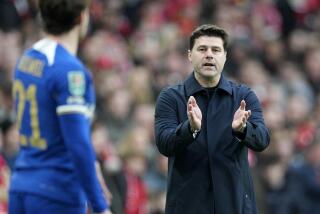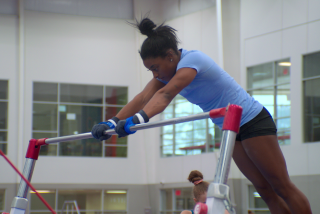WORLD CUP ‘94: 18 DAYS AND COUNTING : Laid-Back Leadership : Argentina Coach Basile Will Stretch the Rules, but He Is Undecided About the Status of Maradona
- Share via
If a Hollywood studio were to cast an actor to play Alfio Basile, chances are Robert Mitchum’s name would come up.
Basile, 50, is a large, hulking character with wrinkled features and sad, penetrating eyes. He is a chain-smoker, an habitue of coffee houses and the race track. He has the look of someone you would rather not meet in a dark alley.
He is also Argentina’s national soccer team coach.
His task this summer is nothing short of Herculean. He is expected to emulate his immediate predecessors, Cesar Luis Menotti and Carlos Salvador Bilardo, and lead an inconsistent and erratic Argentine team to victory in the World Cup.
So far, things are not going well. Argentina is struggling and Basile has stopped speaking to reporters.
So, it is difficult to know whether Basile is angry, concerned or indifferent about Argentina’s recent run of bad results, including a 3-3 tie with Chile in Santiago and a 1-0 loss to Ecuador in Guayaquil in the past two weeks.
It is equally difficult to know whether he has decided to include a visibly out-of-shape Diego Maradona on the World Cup team.
And it is impossible to understand--as the Argentine media have been quick to point out--why Basile appears to be losing control of his players. Two examples will suffice:
When the Japanese government refused to grant Maradona a visa to enter the country for the Kirin Cup tournament this month because of his record of drug abuse, Argentina’s players took a vote among themselves and refused to travel to Japan without their captain.
Basile was not consulted in the decision and apparently neither he nor the Argentine soccer federation had the gumption to override the players.
Similarly, when Maradona and teammates Gabriel Batistuta and Oscar Ruggeri left training camp and attended an all-night party at a discotheque, Basile appeared unperturbed.
“Players are only human,” he said. “They have girlfriends or wives. Every one of them used their free time as they saw fit after training.”
As a former national team member himself--albeit only a fringe player who saw action in a handful of international matches--Basile might be a little too understanding of his players’ impulses.
That would be in sharp contrast to his predecessor, Bilardo, who coached Argentina to its 1986 World Cup triumph in Mexico and to second place four years later in Italy.
Claudio Caniggia (who, like Maradona, has served a lengthy suspension from the game for cocaine use since the Italia ’90 tournament) has played for both coaches. During the Copa America, or South American Championship, in Chile in 1991, he made this comparison between them:
“Bilardo was a dictator,” Caniggia told Eric Weil, an Argentine-based journalist covering the tournament for London’s World Soccer magazine. “During training sessions, he got angry if we put our hands on our waist or looked anywhere else. He insisted that we should all be obsessed with soccer, like him.
“Under Basile, we have much more liberty. We can all give our points of view and don’t have to spend hours watching videos of matches. Basile isn’t obsessed like Bilardo was.”
Which is not to say that Basile has not devoted his life to soccer. On the contrary.
Born in Buenos Aires on Nov. 1, 1943, which makes him a genuine “porteo,” as Argentines call those from the port city, Basile took to the game at an early age.
He made his professional debut with the Racing Club of Avellaneda on Dec. 3, 1964, and stayed at the club until 1970.
During that time, Racing achieved all that a South American club can achieve--it won the Argentine championship in 1966, followed that up by winning the Copa Libertadores, or South American club championship, in 1967 and then won the Toyota/Intercontinental Cup for the world club championship that same year.
For Basile, a defender who was not afraid to foul opponents if that was the only way to stop them, the latter competition was what earned him the “thug” reputation that he has never been able to completely erase.
In the deciding game of a three-match series between European champion Glasgow Celtic and South American champion Racing, Basile spat at one of the Scottish players, sparking a brawl that resulted in five players being red-carded.
After he retired as a player in 1975, Basile’s coaching career involved a series of stops at no fewer than eight Argentine clubs of varying ability and one Uruguayan club, Nacional of Montevideo. His best achievements were a couple of second-place finishes in the Argentine league.
So, when Bilardo stepped down after the 1990 World Cup, Basile was not high on anyone’s list as a possible successor. The favorite was Daniel Passarella, captain of Argentina’s 1978 World Cup-winning team, who had led River Plate to the national championship in his first season as coach.
But the Argentine federation, split between the supporters of former coaches Menotti and Bilardo, each with different philosophies about how the game should be played, reached a compromise, selecting Basile, who had aligned himself with neither camp.
Even Basile was surprised by the choice.
“Usually, they pick a coach in charge of a successful club--as was the case with Menotti and Bilardo--and I was out of work at the time,” he told Weil.
Basile’s first match in charge came on Feb. 19, 1991, against Hungary in Buenos Aires. It resulted in a 2-0 victory and began a remarkable string of 33 consecutive games without defeat, including 31 full internationals.
During that streak, Argentina achieved something it had not achieved in 32 years: It became South American champion in 1991 by winning the Copa America tournament in Chile, then successfully defended its title two years later in Ecuador. In between, it was victorious in the first Intercontinental Cup in Saudi Arabia in 1992.
Basile was riding high. How many other national team coaches in the world had gone undefeated for two years and won two continental championships? He was somebody, his opinion counted, he was able to voice it and people would listen.
“For me, the rules (of soccer) are perfect,” he said. “Nothing has to be changed. But I would like to see soccer played between teams of 10. It could be interesting.
“When they send off one or two players, the game usually becomes more open.”
Under Basile, Argentina has, at times, played excellent and entertaining soccer, but the closer the World Cup has come, the more into a defensive shell the team has crept. It is as if the pressure of 1994 and the thought that he might not be able to bring the World Cup back to Buenos Aires has forced Basile back into his old habits as a defender.
The coach and the team have lost a great deal of confidence over the past year. It began when Colombia ended the 33-game streak by defeating Argentina, 2-1, in Baranquilla during World Cup qualifying play. It became a crisis when Argentina crashed to an unheard-of 5-0 defeat at home to Colombia.
“This was a very tough blow,” Basile said at the time. “I am entirely responsible and this was my worst day as a coach. We were beaten by a better team.”
Had Paraguay been able to defeat Peru in Lima that same day instead of tying, 2-2, Argentina would have been eliminated and would not be coming to the United States. As it was, Basile’s team was forced into a two-game playoff against Australia, which it won, 1-1 and 1-0, to become the 24th and final World Cup participant.
It was against the Australians that Basile reorganized his side, bowing to public pressure and including Maradona on the team even though the midfielder clearly was out of shape. Maradona had not played on the Copa America-winning teams or in any of the previous qualifying matches.
His inclusion against Australia upset the balance of the side and Argentina has not looked anywhere near as good as it did in Basile’s first two years in charge. The coach, praised before, has become the target of fierce criticism.
This has forced Basile to worry more about losing in the United States than about winning.
“What you have to realize,” he said recently, “is that both Brazil and Argentina are under enormous pressure. We have the whole weight of our soccer history on our shoulders.
“When we win a match, everybody back home rushes into the streets to celebrate. It’s the result that counts.”
World Cup Coach Profile
Name: Alfio Basile.
Born: Nov. 1, 1943, Buenos Aires.
Nationality: Argentine.
Date became national coach: Fall, 1990.
Cumulative record: 24-4-16.
Little-known fact: Away from soccer, Basile haunts two places in Buenos Aires--the horse racing track and all-night coffee houses, where he chain-smokes, drinks cup after cup of espresso and talks with friends until the wee hours.
Honors: As a player, Basile won an Argentine championship (1966), a South American club championship (1967) and a world club championship (1967) as a defender for Racing Club. As a coach, he has led Argentina to two Copa America, or South American Championship, victories (1991 and 1993) and one Intercontinental Cup (1992).
More to Read
Go beyond the scoreboard
Get the latest on L.A.'s teams in the daily Sports Report newsletter.
You may occasionally receive promotional content from the Los Angeles Times.








